GSD Researcher
Mike Ball Dive Expeditions Researcher
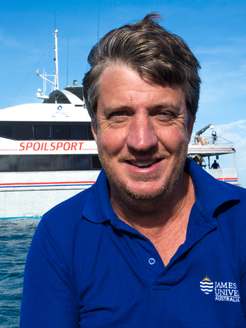
Richard Fitzpatrick
Richard is an Emmy award winning underwater cameraman and marine biologist. He has shot more than 50 films for clients such as the BBC, National Geographic and Discovery Channels and is renowned for filming complex behavioural sequences, many never seen before. With over 10000 hours underwater he has filmed around the world from the crystal clear coral gardens of the Great Barrier Reef to the murky waters of the Amazon. His most recent work is the three part series Great Barrier Reef, produced for the BBC/Discovery Channel/ Channel Nine, where he was a producer and the principle cameraman. Richard has pioneered unique techniques for catching sharks by the tail for his active research programs. Attaching satellite tags to the sharks over the summer months and tracking there whereabouts over the course of about a year. The link below shows Richard Fitzpatrick talking about the research project based on Raine Island on the Northern Great Barrier Reef. Thousands of turtles nest on Raine Island and as a result, there is plenty of food for tiger sharks.It is a great location to study their movements and patterns.
Beqa Adventure Divers Researcher
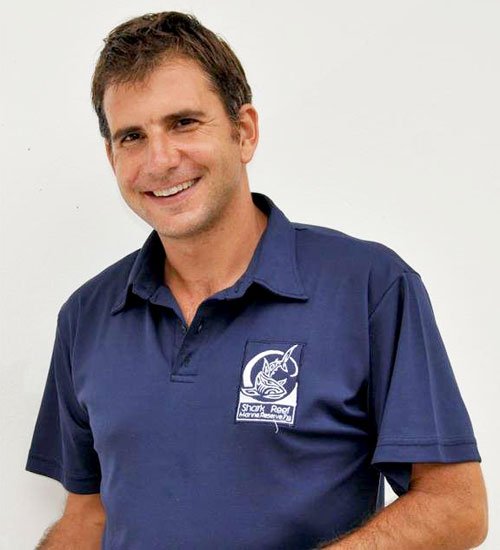
Dr. Juerg Brunnschweiler
Juerg has been fascinated by sharks and their relatives ever since he started diving and encountered his first white tip reef shark in the Red Sea. After his Masters thesis that looked at the interaction between blacktip sharks and sharksuckers, he continued with a PhD studying the behaviour and ecology of free-ranging sharks using the full range of telemetry techniques from direct observation to acoustic and satellite tracking. Today, Juerg’s research interests encompass the behaviour, ecology and conservation of free-ranging fish with special emphasis on the bull and whale shark and remoras. He is also interested in marine tourism, in particular how sharks respond to food provisioning. He has been involved in the set-up and establishment of the Shark Reef Marine Reserve in Fiji, a most successful small-scale marine conservation project in the South Pacific. For a list of Juerg’s publications, please see www.orcid.org/0000-0002-9901-3279.
Nautilus Researcher

Nicole Nasby Lucas
Nicole Nasby Lucas is a Research Biologist with the Marine Conservation Science Institute. She grew up in Minnesota and earned a B.A. in biology from St. Olaf College and an M.S. in Marine Resource Management from Oregon State University. Nicole has been studying the white sharks of Guadalupe Island, Mexico since 2001. Her research includes satellite tagging and tracking studies to examine migration patterns and behavior of northeastern Pacific white sharks. She is also responsible for managing the Guadalupe Island white shark photo-ID program which is important for tracking the visitation patterns of individual sharks as well as monitoring the overall status of the population. Nicole is interested in the behavior, migration and habitat use of marine fishes and sharks as well as the management and conservation of marine life and their habitats. For a list of Nicole’s publications, please see www.marinecsi.org/publications.
Undersea Hunter Researchers

Sylvia Earle: National Geographic
Renowned marine biologist and National Geographic explorer-in-residence Dr. Sylvia Earle has made many appearances on the Undersea Hunter fleet, and we’re always thrilled to have her as a guest. Please see Smithsonian Expedition. www.nationalgeographic.com
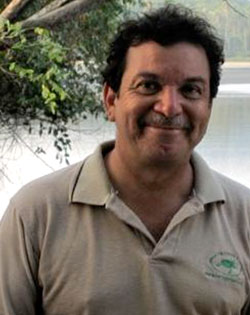
Randall Arauz : PRETOMA
Randall Arauz is one of the lead scientists at PRETOMA, a Costa Rican non-profit NGO founded in 1997. They are a marine conservation and research organization working to protect ocean resources and promote sustainable fisheries policies in Costa Rica and Central America. They direct their efforts in the following categories: Direct in-the-field conservation projects (often at Cocos Island) Research and outreach on board commercial fishing vessels Public awareness and education Litigation and policy advocacy Pretoma gathers and publishes data on sharks and sea turtles, including in satellite tagging studies and observing national longline and shrimp fishing fleets. They also maintain direct conservation projects to protect sea turtles and their nests on beaches on the Pacific coast (over 170,000 sea turtle hatchlings protected). PRETOMA works directly with the Ministry of Environment and the Costa Rican Congress and regularly file lawsuits against government agencies such as the Fisheries Institute and Customs Department when policies promote unsustainable exploitation of marine resources. Please visit PRETOMA for more information.

Todd Steiner: Turtle Island Restoration Network
Todd Steiner is a leading advocate for the world’s oceans and marine wildlife. His work with the Turtle Island Restoration Network is based on science, fueled by people who care, and effective at catalyzing long-lasting positive change that protects the likes of green sea turtles, whale sharks and steelhead trout. Turtle Island’s mission is to “mobilize people in local communities around the world to protect marine wildlife and the oceans and inland watersheds that sustain them.” They accomplish their goals through grassroots empowerment, consumer action, strategic litigation, hands-on restoration, environmental education, and by promoting sustainable local, national and international marine policies. Turtle Island has completed several shark tagging and turtle research projects at Cocos Island on Undersea Hunter vessels. Please visit www.seaturtles.org.
Marine Dynamics Researcher

Alison Towner
Inspired from a young age by her late father’s ambition to dive with White Sharks, Alison graduated from UK’S Bangor university in 2006 with a BSc Honours in Marine biology.
After working in the Red sea as a PADI instructor, she joined the Dyer Island Conservation Trust, South Africa, in January 2007 and has remained on site ever since! Alison spent the first 5 years as a guide for Marine Dynamics Shark Tours interacting daily with divers. This opportunity enabled her to collect extensive observational data on white sharks from which she completed her MSc through the University of Cape Town. With fellow colleagues at the DICT, Alison has co authored publications on white shark regional population dynamics, wound healing, movements and tagging. As a qualified SAMSA skipper, Alison continues with her studies on white sharks in Gansbaai with a focus on tracking and telemetry and a continued interest in environmental influences, particularly climate change.
She is currently in progress with her PhD which examines the relationship between cage diving and behaviours of white sharks in control and cage dive designated zones.
Basking Shark Scotland Researcher
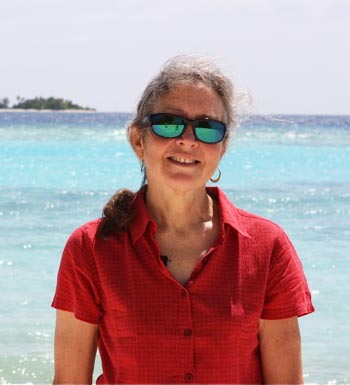
Dr Mauvis Gore
Mauvis has been working her way up the size scale from zooplankton to whale sharks. She began working on sharks in 2004 with basking sharks and she continues to study these wonderful giants. Mauvis’s work on sharks covers their behavioural ecology, conservation, relationship to their habitat and their importance in the food chain. She studies the effect of provisioning sharks on their subsequent behaviour. Her work also involves tagging to understand the movement patterns and sharks’ use of areas in relation to setting aside marine protected areas, working with government departments to achieve this. She also collaborates on investigations of the hormonal status to and genetic studies, both of which are important in understanding factors behind the declining populations. Mauvis is very keen on raising awareness of the catastrophic position of sharks and their very bad press. She loves to gives talks, presentations and lectures to the public, children and focus groups to try and change public opinion of sharks. Her work on sharks takes her to the Caribbean Sea, Red Sea and Indian Ocean. Please visit www.marineconservationinternational.org.
Jim Abernethy’s Scuba Adventures Researchers

Dr. Neil Hammerschlag
My research centers broadly on the behavioral ecology and conservation biology of marine predators. My current and future research has three core themes: (1) understanding how predator-prey interactions impact individual traits, community structure and ecosystem processes through trophic cascades; (2) evaluating the ecological and evolutionary implications of variation in physiological and morphological adaptations on the movement ecology of marine predators; and (3) examining how coastal urbanization affects the behavior, ecology and fitness of highly mobile fishes. My research philosophy relies on two fundamental approaches. First, I put a strong emphasis on natural history, spending time observing wildlife as a starting point for developing project ideas and testable hypotheses. Second, I apply ecological and evolutionary theory as frameworks for empirical measurements to address and advance my fields of research. My work is highly collaborative and cross-disciplinary among different research groups and institutions. Further, it employs a variety of low- and high-tech tools including visual surveys, stable isotope analysis, biotelemetry, ultrasonography, diet analysis, underwater video, triglyceride assays and blood hormone analysis. I have research projects underway in Florida, Bahamas, South Africa and Australia.
I currently direct the Predator Ecology Lab and Shark Research & Conservation Program (SRC) at the University of Miami. The SRC conducts science centered broadly on the ecology, movement and conservation of sharks. A core component of our work is to foster scientific literacy and environmental ethic in youth and the public by providing exciting hands-on field research experiences in marine conservation biology. Opportunities are especially made available for under-served populations in the sciences. To impact a global, we employ online outreach tools, including webinars, curricula, videos, blogs, and social media. Focusing primarily on the study and conservation of sharks, we employ a full-immersion educational approach that allows students to actively grow as future scientists.

Guy Harvey
Widely recognized today as one of the world’s finest marine wildlife artist, Guy Harvey combines his unique artistic talents with his background as a marine biologist, angler, diver, photographer and videographer, to create marine wildlife art with an unmatched authenticity and visual appeal. Self-taught, Guy’s artistic roots can be traced back to his childhood on the Caribbean isle of Jamaica, where he spent many hours fishing and diving with his father along the island’s south coast. Guy originally pursued a career in academia, earning a Ph.D. in Fisheries Biology and teaching as a Professor at the University of the West Indies. Following a successful first art exhibit in 1986 at the Ft. Lauderdale Boat Show, Guy began painting full time. As his success as an artist grew, Guy was able to get back into the marine sciences by founding the Guy Harvey Ocean Foundation, the Guy Harvey Research Institute and naming the Guy Harvey Oceanographic Center at Nova Southeastern University. These organizations conduct scientific research to help maintain sustainable fisheries and host educational programs to help foster the next generation of marine stewards.

Emily Rose Nelson
Emily Rose Nelson has been fascinated with the ocean for as long as she can remember. This passion forced her out of her landlocked hometown of Chicago and to the University of Miami where she received her Bachelors degree in Marine and Atmospheric Science. Currently, she is a graduate student at the Rosenstiel School of Marine and Atmospheric Science studying Marine Affairs and Policy. It was on a trip with Jim Abernethy and Dr. Neil Hammerschlag in 2012 where she truly fell in love with sharks. Ever since, she has been working with the Shark Research and Conservation Program (www.sharktagging.com). Currently she is the lab’s Shark Satellite Tracking Coordinator. Emily has a broad range of research interests including (1) spatial ecology of apex predatory sharks; (2) direct and indirect effects of predator-prey interactions; (3) evolutionary adaptations using morphological differences within and among species and (4) shark – human interactions.
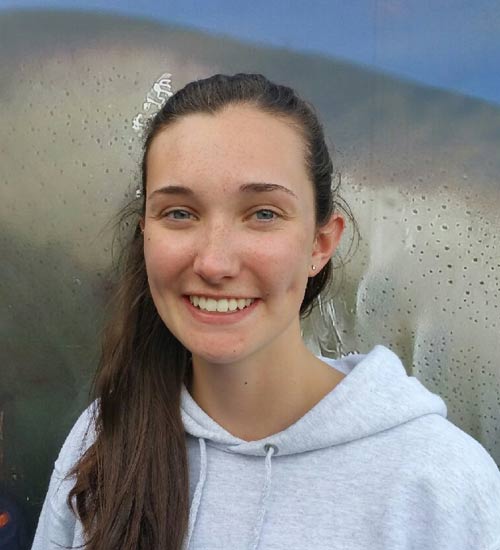
Carolyn Wheeler, Conservationist
Carolyn is an early career scientist, earning a BSc in marine biology from the University of New England. During this time, she completed an honor’s thesis focused on determining sex and maturity of Atlantic sturgeon using non-lethal methods. Additionally during this time, Carolyn collaborated with the University of Miami and Jim Abernethy’s Scuba Adventures to study the reproductive biology of tiger sharks at an aggregation site in the Bahamas. These research projects piqued her interests in the field conservation physiology early in her career. She will begin a MSc in the fall of 2016 researching the effects of ocean warming on the development, survival and post-hatch physiological performance of epaulette sharks.
Divelink Cebu Researcher
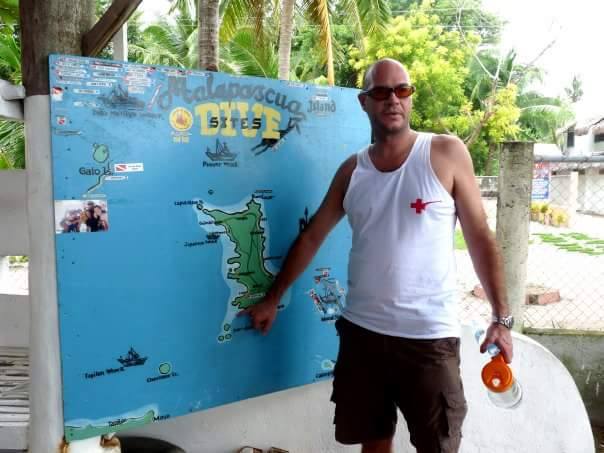
Dr. Simon Oliver
Dr. Simon Oliver is a marine ecologist with a particular interest in the biology, behaviour, ecology and conservation of sharks. His research interests revolve around using integrated approaches to understanding shark behaviour in the context of their use of habitats, cooperation, and predator-prey interactions. He is focused in the behavioural ecology of oceanic sharks in response to their cleaning, hunting, and migration strategies, and applying associated knowledge to address conservation problems. In 2008, he founded the Thresher Shark Research and Conservation Project (TSRCP) and its field station in the Philippines to promote and disseminate shark research, education and conservation to a broad local, regional and international public and scientific outreach. TSRCP regularly hosts BSc and MSc students who join its expeditions to assimilate data for their thesis projects. These have enabled him to expand the scope of my research interests to encompass the relevance and impact of shark conservation on local communities, and foster international collaborations.
